new shores
From Bollywood to Ray: big retrospective from classical to popular indian film.
new shores programme
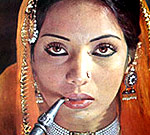
» THE CHESS PLAYERS
(Shatranj ke khilari), Satyajit Ray, India , 1977, 113′
The most extraordinary chess play in the human history.
- D,M: Satyajit Ray
- S: Satyajit Ray, po kratki zgodbi Munshi Prem Chanda ‘Shatranj Ke Khilari’
- C: Soumendu Roy
- E: Dulal Dutta
- SO: Narinder Singh, Samir Majumdar
- P: Suresh Jindal (Devki Chitra Productions)
- CA: Sanjeev Kumar, Shabana Azmi, Saeed Jaffrey, Farida Jalal, Amjad Khan, Victor Bannerjee, Sir Richard Attenborough, Tom Alter
The action takes place in 1856, in Lucknow, capital of the moslem kingdom of Oudh. The king is Wajid Ali Shah, who prefers to devote himself to the pleasures of art instead of submitting to the subterfuges and stakes of politics. He dedicates his time, sequestered in his palace, to poetry and to recitals of music and dance. The English Company of India, which is strengthening its grip on the country (in 1858 the British crown would directly take over control of the government), charges general Outtram with dethroning the king, who eventually abdicates without a fight. Parallel to this, two aristocrats ravenously indulge their passion for chess while neglecting everything else, beginning with their respective wives. We first see them playing chess in their houses, and they end up playing outdoors, without having noticed the historic changes ocurring under their noses.
In my film The Chess Players I do not condemn new things. But I am more interested in life, that is vanishing, and in representatives of that way of life.(Satyajit Ray)
Festivals, awards (selection): Berlin 1978, best director award and jury award - Filmfare Mumbai (Bombay) 1979.
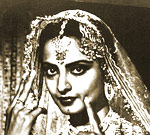
» UMRAO JAAN
(Umrao Jaan), Muzaffar Ali, India, 1981, 145′
The magical highlight of Bollywood: immortal Rekha, embellished by the golden voice of legendary Asha Bhosle.
- D:Muzaffar Ali
- S: Muzaffar Ali, Javed Siddiqui, Shama Zaidi
- C: Pravin Bhatt
- M: Khayyam
- S:: Chaturvedi
- P: Muzaffar Ali (Integrated Films)
- CA: Rekha, Farouque Shaikh, Naseeruddin Shah, Raj Babbar, Shaukat Kaifi, Dina Pathak, Leela Mishra, Gajanan Jagirdar, Prema Narayan
19th century, Northern India. An unknown horseman rides up and abducts a girl not far from her family house. Umrao Jaan’s life takes the biggest turn at a very young age, when she is separated from her family safety and sold off and well-versed in the in the art of giving pleasure. She is admired for her beauty and her singing voice. Many men come into her life, but she only loves young prince ling. But their love did not last too long. Nawab Sultan is too weak a man to defy society. Although sweet courtesan is admired by her childhood friend and a mysterious, dark stranger, she decides no longer to dance for the people. It is not easy to escape from the world she lives in, but she makes it and years later circumstances bring her back to her lost family.
Ever since the premiere of this film, a day has not passed in my life, when someone would not congratulate me for the films. It is a bit like someone would every day pour nectar in my glass. (Muzaffar Ali)
Festivals, awards (selection): best director and music award - Filmfare Mumbai (Bombay) 1982, Rekha - actress of the year.
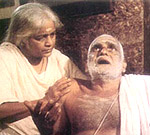
» BIRTH
(Piravi), Shaji N. Karun, Indija, 1988, 108′
In every moment hope is prepared for a new birth.
- D:Shaji N. Karun
- S: Shaji N. Karun, S. Jayachandran Nair, Ragunath Paleril
- C: Sunny Joseph
- E: Venugopal
- SO: Krishnanunny
- M: G. Aravindan
- P: Film Folk
- CA: Premji, Archana, C.V. Sreeraman, Mullenezhi, Lakshimi Krishnamoorthy, Gopalakrishnan
In a little village in the state of Kerala in South India, a frail but dogged old man Chayar waits in hope for his missing son Raghu to return. Raghu had disappeared the month earlier during a political demonstration banned by the ‘State of Emergency’ and at the beginning of monsun period. In the hope of news, the old man goes daily by boat to the pier, which is the terminus for the bus that runs daily between his village and Trivandrum, and waits patiently at the bus stop for Raghu’s return. Learning of the boy’s arrest, he goes to Trivandrum to meet the Home Minister, once his protĂ©gĂ©. He returns to the village reassured that his son will eventually return. The man’s daughter however doesn’t share her father’s optimism and through her own investigation learns that her brother probably died in police custody after being tortured but she can not bear to tell her father who continues to hope and search. However the old man’s grip on reality is slipping fast and he starts dreaming his son is with him..
Monsoon reminds me of birth. Water is the source of life. Because sun cannot be seen, a man looses perception of time during the monsoon periods.Therefore the film speaks about the loss of reason. (Shaji N. Karun)
A film rarely leaves you so deeply touched, that every comment seems like an intruder. (Maithali Rao, Sunday Observer)
Festivals, awards (selection): golden camera for a debut - Cannes 1988, silver leopard - Locarno 1989.
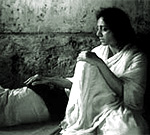
» MY OWN
(Swaham), Shaji N. Karun, Indija, 1994, 146′
Mine is that which forever belongs only to me.
- D:Shaji N. Karun
- S: Shaji N. Karun, S. Jayachandran Nair, Reghunath Paleri
- C: Hari Nair
- E: P.Raman Nair
- SO: Krishnan Unni
- M: K. Raghavan, Isaac Thomas Kottukapally
- CA: Aswani, Hari Dass, Gopi, Mullenezhi, Praseetha, Sarath, Vemani Vishnu
Swaham sketches the plight of a widowed mother and her children whose small coffee-shop no longer returns enough income to feed the family. The family of Ramayyar holds a small coffee shop in an isolated village. Ramayyar, an affectionate husband, dies in an accident. His wife Annapoorna, only finds herself with two children.
You know, I perceive light to be truly deceptive. Therefore I have decided to investigate what happens in the darker areas of light. I found it necessary to explore the darker side of all the emotions, that I wanted to work with, in order to get to know them really deeply - you know how manyshades of darkness there are.(Shaji N. Karun)
Festivals, awards (selection): Cannes 1994, best film - Innsbruck 1995.
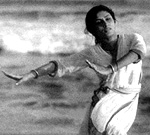
» WHAT THE SEA SAID
(Yugant), Aparna Sen, Indija, 1995, 129′
Scenes from the marital life from an Indian, female perspective.
- D,S: Aparna Sen
- C: A. Shashikanth, Dilip Verma
- E: Maloy Banerjee
- SO,M: Jyotishka Dasgupta
- CA: Dutt Anjan, Rupa Ganguly, Pallavi Chatterjee, Kunal Mitra, Anil Lenka, Neema Rahman, Subrata Nandy
This is not a feminist film at all. Each of the protagonists has their own points of view and I think that I split myself between both of them, husband and wife.(Aparna Sen)
Festivals, awards (selection): Locarno 2002.

